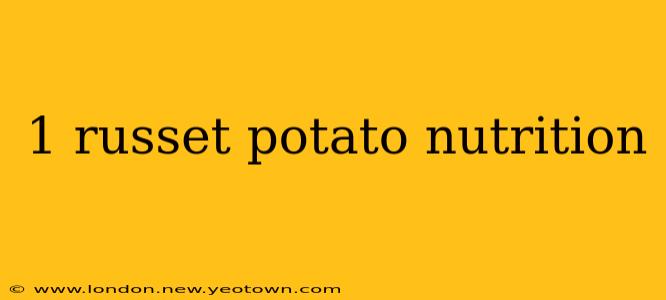The russet potato. A culinary staple, a side dish superhero, and the backbone of countless comfort food recipes. But beyond its versatility in the kitchen lies a surprisingly rich nutritional profile. This humble spud is more than just carbs; it's a surprisingly good source of several essential vitamins and minerals. Let's peel back the layers (pun intended) and explore the nutritional powerhouse that is the russet potato.
What are the Nutritional Benefits of Russet Potatoes?
Russet potatoes are a fantastic source of complex carbohydrates, providing sustained energy throughout the day. But that's just the tip of the iceberg. A medium-sized baked russet potato (about 5.3 ounces or 150 grams) offers a wealth of nutrients, including:
- Vitamin C: A powerful antioxidant crucial for immune function and collagen production.
- Potassium: An essential electrolyte vital for maintaining healthy blood pressure.
- Vitamin B6: Important for brain development and function, as well as red blood cell formation.
- Dietary Fiber: Promotes healthy digestion and can help regulate blood sugar levels.
- Manganese: A trace mineral that plays a role in bone health and metabolism.
Think of the russet potato as a humble, nutrient-dense package. It's a budget-friendly way to add essential vitamins and minerals to your diet.
How Many Calories Are in a Russet Potato?
The calorie count of a russet potato can vary depending on its size and preparation method. A medium-sized baked russet potato typically contains around 160 calories. However, adding butter, sour cream, cheese, or other toppings can significantly increase the calorie count. It's important to be mindful of added fats and oils when preparing russet potatoes.
Are Russet Potatoes Good for Weight Loss?
This is a question that often sparks debate. While russet potatoes are relatively high in carbohydrates, they also provide fiber, which promotes satiety and can aid in weight management. The key is moderation and mindful preparation. Baked or boiled russet potatoes, without excessive added fats and oils, can be part of a balanced weight-loss diet. However, fried or heavily processed russet potato dishes should be consumed sparingly.
What are the Potential Downsides of Eating Russet Potatoes?
While generally healthy, excessive consumption of russet potatoes can have some drawbacks. Their high carbohydrate content can contribute to blood sugar spikes in individuals with diabetes or insulin resistance. Additionally, some people may experience bloating or gas after consuming potatoes due to their starch content.
Are Russet Potatoes Gluten-Free?
Yes, russet potatoes are naturally gluten-free. This makes them a safe and suitable option for individuals with celiac disease or gluten intolerance.
How Can I Incorporate More Russet Potatoes into My Diet?
Russet potatoes are incredibly versatile. Beyond the classic baked potato, you can:
- Roast them: Toss with herbs and spices for a delicious side dish.
- Mash them: Create creamy mashed potatoes, a comfort food classic.
- Make potato salad: A picnic staple or a delightful side.
- Use them in soups and stews: Add substance and flavor to your favorite recipes.
- Make potato skins: A fun and flavorful appetizer.
Remember to choose russet potatoes that are firm and free of blemishes for optimal quality. Proper storage in a cool, dark, and dry place will help maintain their freshness.
The russet potato, a seemingly simple food, offers a surprising array of benefits. By understanding its nutritional value and incorporating it mindfully into your diet, you can reap the rewards of this versatile and nutritious vegetable.

